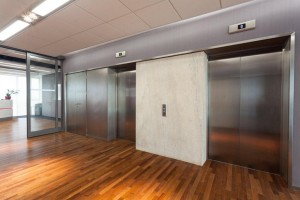Lift Modernisation
Subject to usage levels and the extent of effective preventative maintenance having been provided, lifts that are 20 or more years old are due for a major modernisation.
Equipment of this age will typically experience high breakdown rates, trapped passenger incidents and be generally unreliable. The lift(s) will also exhibit signs such as outdated and severely worn, damaged and corroded interiors as well as internal and external doors and frames.
It can be challenging to find technicians trained in maintaining equipment of this age and the technology and components become obsolete and difficult, if not impossible, to source. Many older lifts may not be compliant with current codes and regulations, including where applicable, suitable disabled access.
Issues are not just with old equipment but with poor performance, long waits, jerky/ rough and noisy ride, safety issues including inaccurate levelling, doors striking passengers and/ or without automatic closers, excessive gaps in door tracks, slippery surfaces are also plaguing some newer equipment.
The lift may also have ineffective or inoperable call buttons, indicators, communications and signalling devices, poor normal and emergency lift car lighting levels. Perhaps the building is undergoing some renovations and the look and operation of the lift needs to be matched to the improved building.
The benefits of lift modernisation
During the lift modernisation process, the lifts will see a dramatic reduction in power consumption and operating costs, in many cases a reduction of 60 percent or more. Immediate and on-going improvements in lift performance and reliability levels leading to fewer breakdowns and incidence of trapped passengers. Another benefit is the improved safety and performance to be expected after modernisation and, if upgraded for full compliance, reducing accident and litigation risks.
From the outset, new performance-based lift maintenance contracts should be employed, featuring significant cost savings, typically savings of 30 percent or more are regularly achieved. Modernised lifts and their components are more easily maintained for the long-term without limited skill-bases or obsolescence issues and eliminate the need for further major expense on lifts for the long-term (a further period of up to 20 years).
Planning for a lift modernisation
Before undertaking a lift modernisation, the current lift maintenance agreements or contracts should be reviewed, in particular the balance of remaining contract terms, and advance termination notices and/ or special requirements in the event of lift modernisation. This is the perfect time to engage an independent specialist consultant to undertake an initial detailed audit of the lifts. This will establish condition, compliance, any current maintenance and/or urgent repair issues, cost estimates for any/all recommended upgrades or a full modernisation together with the recommended optimum timing of such works.
Ensure funds are either available now or in-line with the modernisation program or can be accumulated through sinking fund and/or special levies within the necessary time. Include a new maintenance contract in conjunction with the lift modernisation works, ideally a custom performance-based contract with terms and conditions in place for optimum protection of the owners and body corporate.
An independent specialist consultant can design, document, tender, review, award contracts and project manage the entire lift modernisation process including the new lift maintenance contract.
Typical benefits of a professional performance based lift maintenance contract will include:
- Improved reliability levels are established in terms of maximum acceptable call rates, per lift, per month and annually
- Maximum guaranteed response times to calls (categorised in terms of required responses) are established and monitored
- Regular (e.g. monthly) reports are generated confirming that maintenance for each period has been performed, summarising all calls for the period, any major repairs carried out in the period or planned for up-coming periods
- Penalty clauses established and strictly applied in the event any of the above is not satisfied
- Assistance with regular independent maintenance audits and performance measurements
- Simple CPI-based price adjustments or, in the event of shorter terms in stable conditions, fixed price contracts over the entire term
- Payments monthly in arrears, and only after receipt of monthly reports confirming the work has been carried out to the acceptable levels as set out in the contract
- Ability to terminate the contract forthwith in the event of non-performance or if major lift upgrade/modernisation works are to be undertaken
- Ability to extend initial contract periods at mutually agreeable rates, e.g. original rates plus CPI adjustment
Professionally designed performance-based lift maintenance contracts will ensure the equipment is maintained to established and measurable performance levels and provide regular preventative type maintenance – often solving problems before they occur. The minimum frequencies and extent of maintenance visits will be established and monitoring mechanisms put in place.
Engaging an independent specialist consultant to assist in the preparation of, and project manage, the entire lift modernisation process including the new lift maintenance contract will ensure the best outcome for the owners and body corporate.
This article was contributed by Bryan Fulcher of Innovative Lift Consulting.


Leave a Reply
Hi Bryan
I note in your article that you make no mention of lift maintenance to comply with an Australian Standard, does such a standard exist?
Further are there any legislative requirements to have the lift serviced at any particular interval or is inspection period judged on a case by case basis?